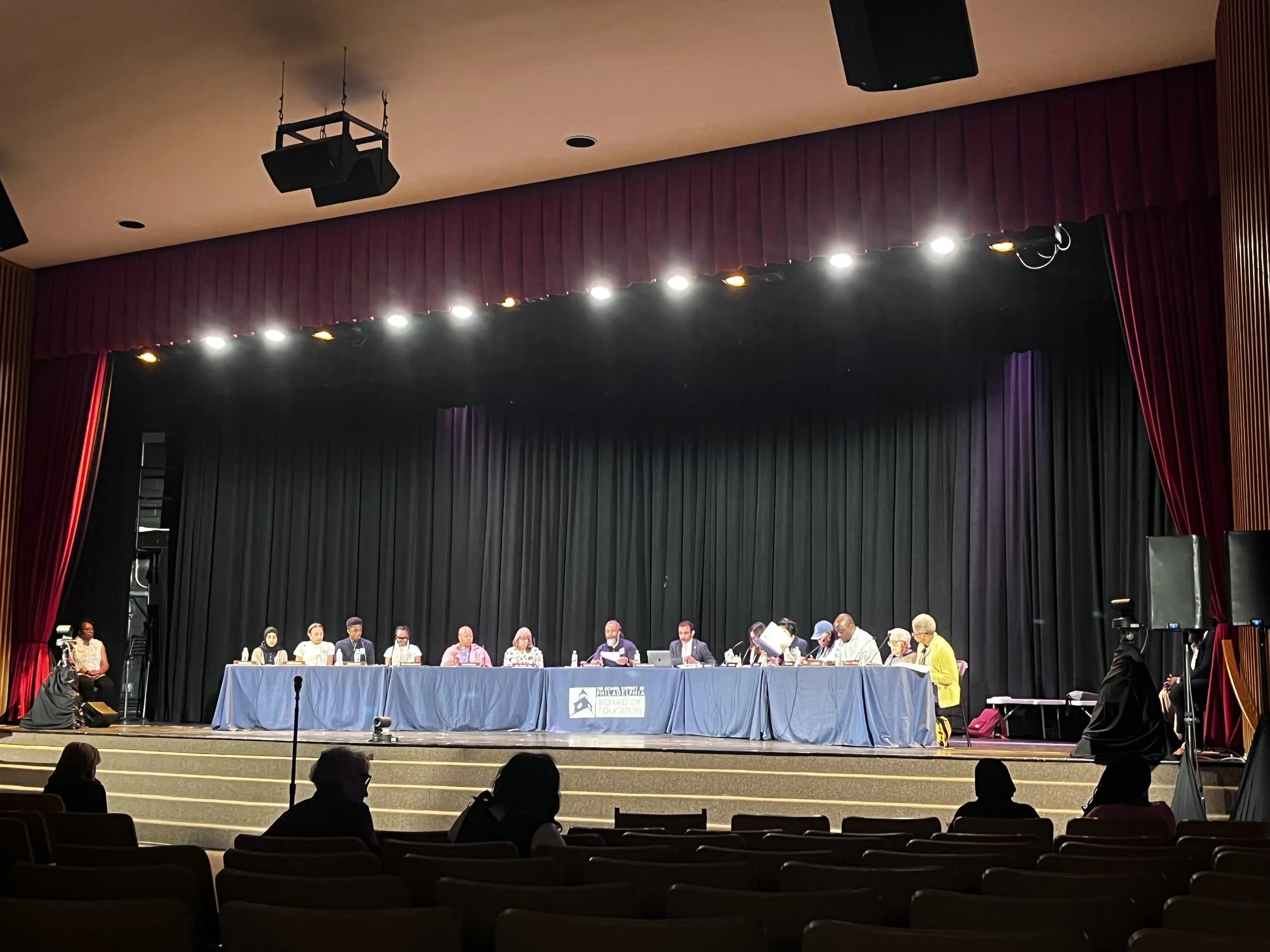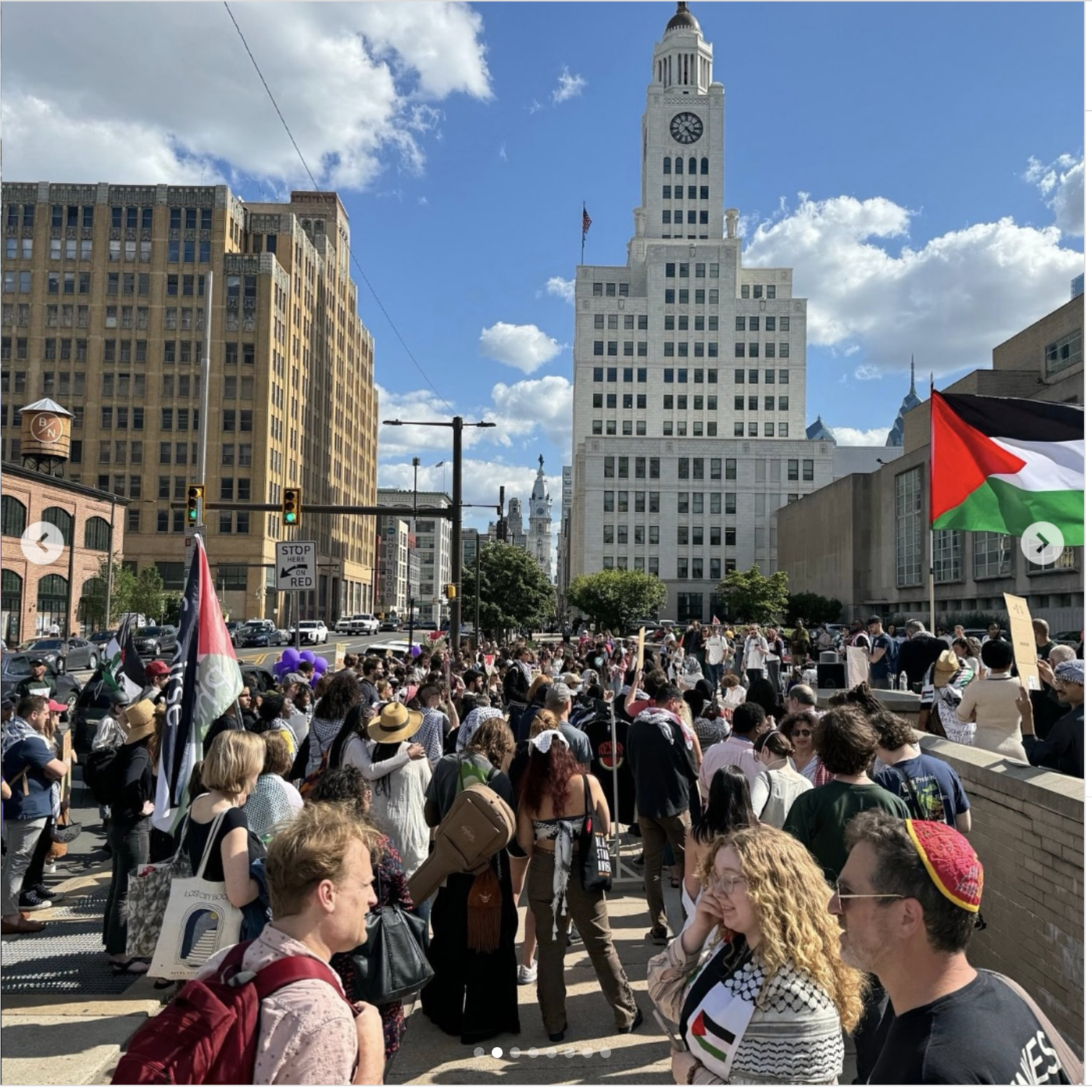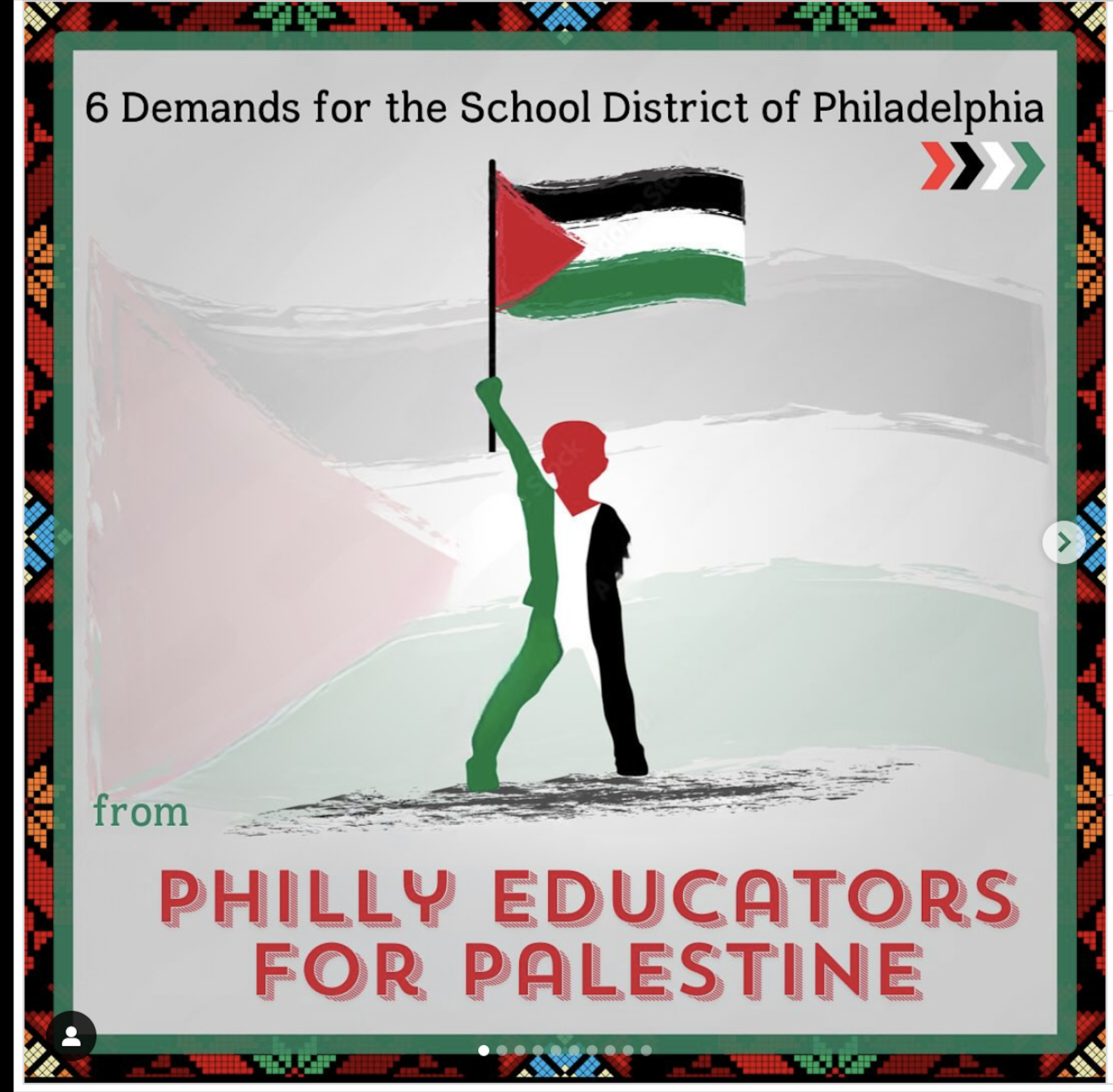Philadelphia School District’s Handling of Palestine Has Been Abysmal, Parents and Teachers Say
Lauren Abunassar
As pro-Palestine protests continue gaining momentum on college campuses around the world, primary and secondary school teachers, students, and families are bringing the fight for their right to teach about Palestine to the Philadelphia Board of Education. At yesterday’s public school board meeting, teachers, staff, and families concerned about the protection of free speech in school testified about their growing concern that the district has been mishandling discourse on Palestine in schools. They expressed a deepening fear that the district is turning its back on students’ rights — and desire — to learn about Palestine in school. They also testified that the district has been ignoring Islamophobia and Palestinian students’ trauma. Finally, they claimed that teachers expressing pro-Palestine sentiments have been censored and harassed by pro-Israel teachers and others.
Testifying before the board at yesterday’s meeting, community member Dana Carter recalled the board’s previous meeting on May 30th, when over 100 pro-Palestine protestors gathered outside. “Last Thursday, anti-genocide students testified under aliases because they were afraid of retaliation. That is a reflection of where we are as a learning community.”
On June 6th, parents and teachers spoke out at a meeting with the Philadelphia Board of Education, stating that they were concerned that the board has been stifling free speech about Palestine in schools. Photo credit: Lauren Abunassar
Other meeting speakers, including Lisa Haver, denounced the board’s decision to prevent some protestors from entering the May 30th meeting— in direct contravention of Pennsylvania's Sunshine Act, requiring such meetings be open to the public. “Not every battle for democracy happens on a battlefield,” Haver told the board. “These meetings have become a battle.” At stake, Haver implied, is the ability to even talk about Palestine, much less teach about it.
Haver and Carter were just two of more than 15 speakers to mention Palestine in their testimony. Speaker complaints ranged from the district’s lack of Palestine-related teaching resources to its delay in hosting protected listening sessions with Palestinian students and families to get to know their needs. Board members responded by announcing they planned to host listening sessions as early as June 13th and 18th. But speakers continued to criticize the board for failing to acknowledge how the ongoing genocide of Palestinians in Gaza is impacting students here in Philadelphia.
District parent Helena Pylvainen spoke of her 26 cousins who’ve been killed in Gaza since October 7th. District staff member Nick Palazzolo read anonymous testimony from a Palestinian family who insisted, “we simply want to be recognized.” And district parent Hanan Kayed, who has family in Palestine, spoke of how Palestinian families are impacted by watching the genocide livestreamed. “We have gone through all the cycles of grief,” Kayed said. “All I’m asking is for the district to put out a statement about the genocide taking place… just as it has done in the past for Ukraine.” Kayed was the only speaker of the evening to have her mic cut during her speech due to time, though she was not the only person to speak past her allotted two minutes.
As testimony continued, many speakers echoed the six demands for the school district set forth by Philadelphia Educators for Palestine, which organized the May 30th protest. The list of demands has been signed by over 700 community educators. Chief among the demands is the call for the district to respond more promptly to concerns of discriminatory treatment or suppression of student speech while ensuring there will be no retaliation against students or school staff.
Racial Justice Organizing organized a rally on May 30 to demand that the School District of Philadelphia “adopt a ceasefire resolution, protect students and staff and create space for difficult conversations centered on understanding the ongoing genocides.” Photo Credit: @racialjusticephilly
“As an educator, the lack of district support is deeply problematic,” said Shaw MacQueen, a middle school social studies teacher and co-founder of Philadelphia Educators for Palestine in an interview with Al-Bustan. “Even if [the school district could] just offer space for students or teachers to learn how to have these conversations about witnessing genocides and displacements in multiple places [in Haiti, Sudan, the Congo, Gaza] at once, it would help. To not do that is just not good academics, even if you take out the human point altogether. It’s just not good schooling.”
MacQueen says that he and other educators are perplexed by the district's lack of Palestine teaching resources, given the city’s progressive history. As an example, MacQueen noted the district’s early embrace of Policy 252, a policy meant to ensure the safety, equity, and protection of students regardless of gender identity or expression. Philadelphia was also one of the first cities to mandate that students take African American history in order to graduate. Palestine, however, has been treated differently. “I don’t know why the district is so scared,” said MacQueen. “We have a board that is appointed. So, there is a fear of losing [the] positions they’re in. It’s understandable. But does it justify silence? Especially when there are over 35,000 [Palestinians] dead.”
Philadelphia Educators for Palestine member Kristin Luebbert has been teaching English and History in Philadelphia since 2001. She currently teaches at the U School and though she has not faced pushback for teaching about Palestine, she worries about how students across the district are going to be negatively impacted by efforts to silo teachers’ efforts to continue educating students. “Because we taught African American history [in class], we spoke about colonization, oppression, who gets to tell their story, and which stories are brought into official documents. This completely dovetails with what’s going on in Palestine,” Luebbert told Al-Bustan. “Students bring up this overlap.”
Luebbert has worked to address students’ questions and their desire to learn more. But she admits there is a vacuum when it comes to support for teachers. “The minute the war in Ukraine began, we got an email about how to support students. There were Russian students who felt uncomfortable but we weren’t worried about that,” Luebbert said. “We have gotten no guidance about Palestinian students, though.”
At yesterday’s school board meeting, teachers testified that they feared that the school district has been turning its back on students’ rights to learn about Palestine. Photo credit: Lauren Abunassar
Charlie McGeehan is a teacher at South Philly’s Academy at Palumbo and a founding core member of BARWE (Building AntiRacist White Educators), an advocacy group dedicated to dismantling white supremacy in schools. BARWE has started a legal defense fund for educators fighting pushback for expressing Palestinian solidarity. Though McGeenhan admitted he initially worried he didn’t know enough about Israel and Palestine to teach about it, he said watching the genocide in Gaza has compelled him to teach about it in his 12th grade civics class. “My students have been open about this being something they want to talk about,” McGeehan told Al-Bustan. “From a BARWE perspective, what we see is directly connected to… legislation that is coming across the country and attacking Black History… We see these attacks on Palestine as very much connected.”
On top of that, McGeehan believes the school district is intimidated by the pushback it has faced from pro-Israel community groups, families, and district staff.
McGeehan also noted that Palestine may shed light on uncomfortable truths about American foreign policy. “Inherent in this is that if you’re teaching this history critically, there is a way you have to shine a critical light on the actions of the American government,” McGeehan said. “You have to raise the connection to the Israeli government. You have to raise students’ attention to the military aid we’re sending… It’s not my job to tell students what to think but it is my responsibility to make room for those conversations.”
McGeehan believes that more teachers would be teaching about Palestine if they weren’t so afraid of pushback and a lack of support from the district. When McGeehan himself was figuring out how to teach about Palestine, he turned to a colleague, Freda Anderson, who has been teaching about Palestine in her history classes long before October 7th. Anderson, who is part Jewish, said she felt compelled to teach about Palestine after learning about the region in summer camp as a young child.
Anderson went on to explain that some teachers feel uncomfortable teaching Palestine because they believe that the district won’t support them, should they face community pushback. “The district isn’t just saying ‘don’t teach about it,’” Anderson explained. “They’re effectively saying, ‘do whatever you want but if someone calls you out, we’re going to say we didn’t know and we’ll throw you under the bus.’”
The consequences of this passivity, Anderson says, are devastating—particularly for the city’s Arab, Muslim, and Palestinian students living in a state of trauma. She thinks especially of one Palestinian student who described struggling with the cognitive dissonance of doing math homework with images of mangled and dead bodies flashing through her mind. Anderson believes the district's inaction is sending students like these the message that it doesn’t care what they’re going through.
Anderson also expressed concern about the negative impact on Jewish students. “The media is trying to paint [Jewish students] as this monolith who all think the same way… I would argue, as someone who is part Jewish, that to not teach about Palestine makes anti-Semitism and anti-Semitic bullying worse,” Anderson explained. “Because it furthers the notion that all Jewish people think the same way and all agree with and stand with a nation state. Not teaching about it allows others to assume they know what all Jews think and feel.”
A number of Jewish parents at yesterday’s meeting also expressed support for teaching about Palestine.
District parent Arielle Sternman connected the harassment of Palestinian students and teachers to the harassment her Jewish grandmother experienced in school. “Today, Palestinian students, including a significant number here in this district are traumatized by actually seeing their Holocaust filmed by its victims as well as by its perpetrators posted to social media,” Sterman said. “They are making personal sacrifices to send money to families [in Palestine], they are dealing with losing loved ones, then they come to school and are told they don’t have a country, they can’t wear the Palestinian flag, they can’t wear [a] keffiyeh, and they have been told they can’t be Palestinian… I would like to say it is an offense to my grandmother and all Jewish people [who] have endured actual anti-Semitism to erroneously name as anti-Semitic anything that causes some Jewish individual’s discomfort.”
“Students and staff in the School District of Philadelphia have endured increasing harassment and censorship for standing in solidarity with Palestine over the last few months,” writes Racial Justice Organizing, @racialjusticephilly on Instagram, adding, “We formed a collective comprised of educators, parents, and community stakeholders from Philly to address the district’s inadequate response to this.” Photo credit: Building Anti-Racist White Educators @BARWE215
Her testimony was echoed by statements from district parent Ben Vershbow and community member Cindy Shapiro Farlino, both Jewish, who similarly denounced the weaponization of anti-Semitism.
To address their concerns, Philadelphia Educators for Palestine wants the district to facilitate, “the honest, critical pursuit of history and diverse views thereof, including the history of Palestine,” as noted in their list of demands for the district. But they also want the district to provide professional development for teachers and district staff, highlighting these diverse perspectives and dialogues.
This may be an uphill battle, however. The district has already canceled one Palestine-related professional development workshop for teachers. And according to Shaw MacQueen, any links to teaching resources have been anemic and devoid of Palestinian perspectives.
Though board members reassured yesterday’s crowd that they were carefully listening to community members' concerns, many felt this was not enough. Thus, educators are encouraging families and students to come forward with their concerns.
“[Gathering] is important for students who have been marginalized, who have been made to think their pain is not important,” Kristin Luebbert told Al-Bustan. “It’s important for people of all backgrounds to come out and say, ‘This is wrong and we need to fix it.’”
***
Lauren Abunassar is a Palestinian-American writer and journalist. A Media Fellow at Al-Bustan, she holds an MFA from the Iowa Writers’ Workshop and an MA in journalism from NYU. Her first book Coriolis was published by University of Arkansas Press as winner of the 2023 Etel Adnan Poetry Prize.




